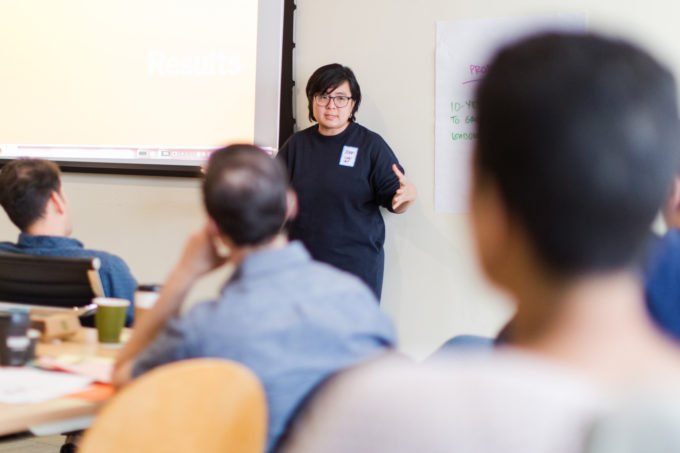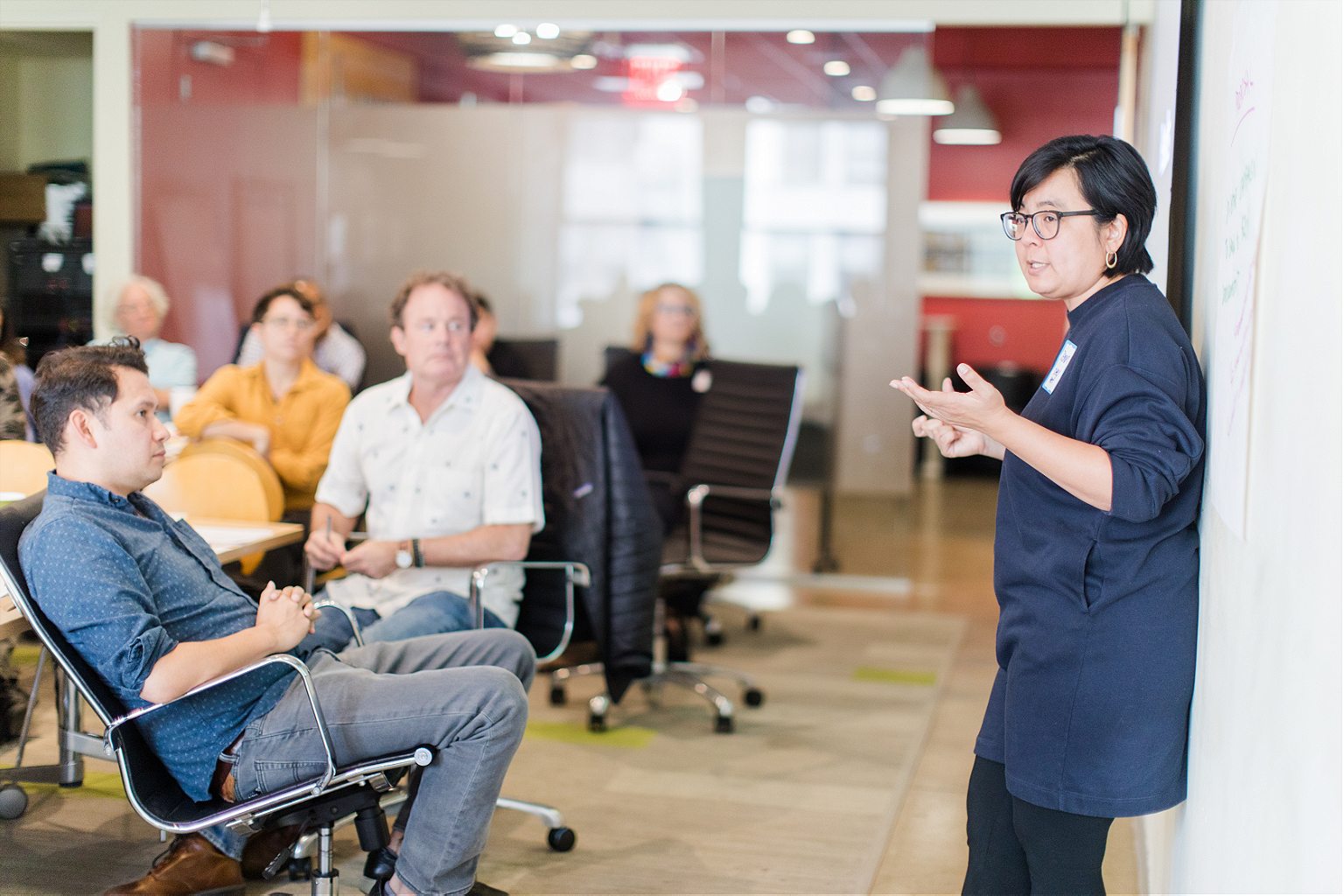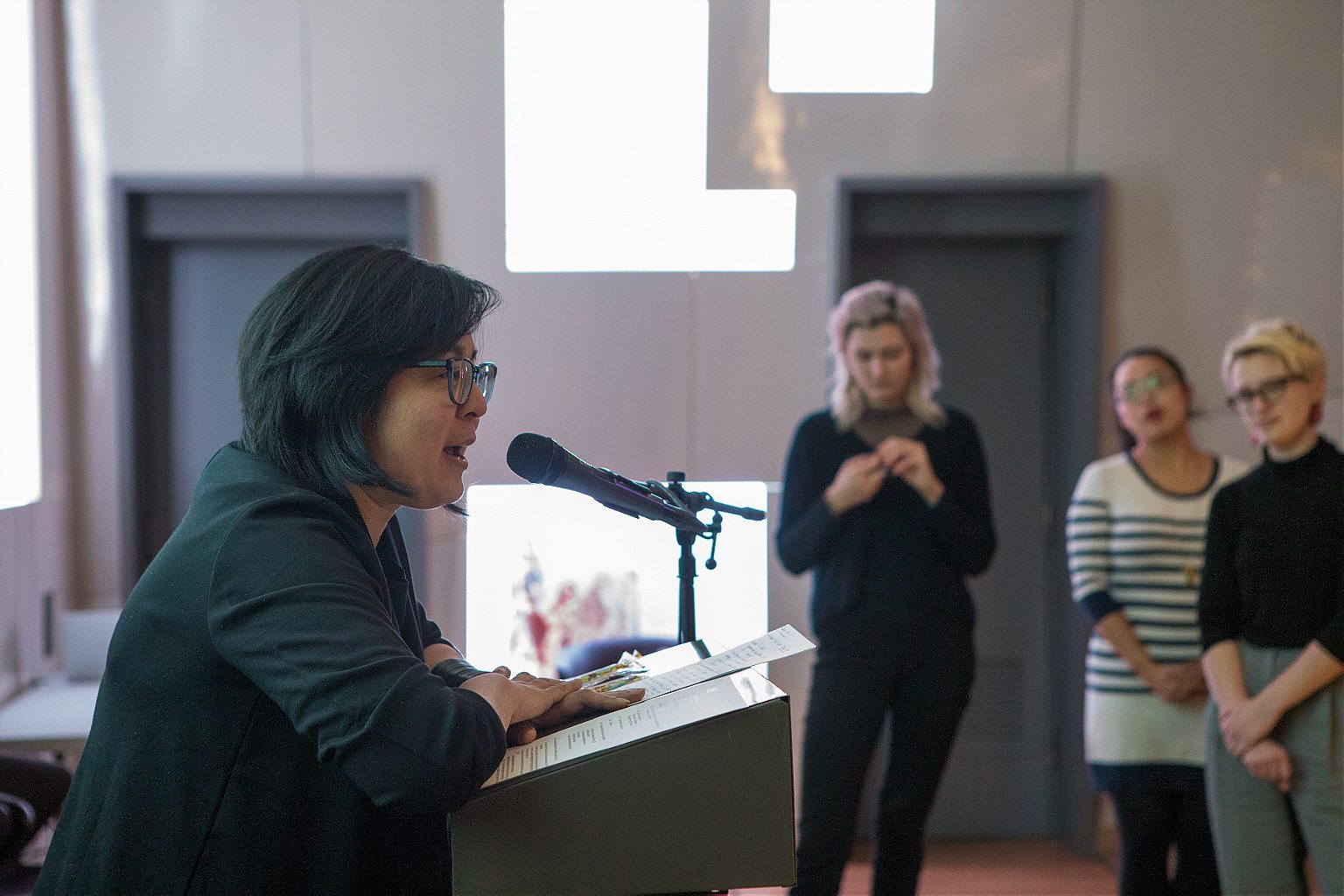
Jennifer Ching is Dismantling the System

How do you tackle poverty in a city like New York City? Jennifer Ching of the North Star Fund has some ideas.
One of host Nathan Thornburgh’s New Year’s resolutions is to stop just stepping past all the human misery in New York City and actually think about helping. But how?
Jennifer Ching might know. She comes from an immigrant family and is a Harvard grad, a lawyer, and now the executive director of North Star Fund, a community foundation that focuses not on just giving money, but also giving power, to the oppressed and the underserved of New York. She and Nathan drink Flor y Machete herbal tea (from an activist herbal collective of course) and talked about the joy of pushing for long-term systemic change in an era of fresh daily outrages.
Read more about North Star Fund, and goddamnit just donate if you can.
Here is an edited and condensed version of their conversation. You can listen to the full episode, for free, on Apple Podcasts, Stitcher, Spotify, or wherever you get your podcasts.
Nathan Thornburgh: Tell me a little bit about what we’re drinking.
Jennifer Ching: Okay. So, we’re meeting in the first week of January, which means we’re meeting when everybody is living the best version of themselves. So if we had met even just last week, I would have been like, here’s a root beer and some whiskey and some like Sweet n’ Low for you to throw in there.
Thornburgh: So, that is not what we’re drinking.
Ching: That is not what we’re drinking. What we are drinking is an herbal mixture that is called Love your Nerves. It’s made of oat straw, lemon balm, chamomile rose, and lavender. It’s hand created by Myrna Cabán Lezcano, an herbalist whose project is called Flor y Machete. She’s a Puerto Rican activist in New York City, who does a lot of healing justice work in communities of color and beyond. So I’m happy to share one of her products with you.
Thornburgh: It’s delicious. What is this going to do for my new year? For my best version of myself.

Ching: I grew up in central New Jersey. I grew up on the edge of a Superfund landfill. I grew up in the seventies and eighties. I grew up the child of processed foods. My brother and I would come home from school and we would open up a can of Chef Boyardee. I’ve really tried to spend my adult life detoxifying myself and finding a different connection to what my tongue or my body deems as appropriate.
Thornburgh: Good sodium-junkie living.
Ching: Exactly. So, now I approach thinking about things like herbal teas. It’s not about trying to get this a great depth of flavor. It’s just about trying to get some proximity to something that tastes just real.
Thornburgh: We’re all trying to live our best lives. I’m trying to not drink alcohol this January. I could just fit it into the slipstream of all the New Year’s resolutioners.
Ching: Yeah. And the long lines at the salad place like everyone else.
Thornburgh: I have an open call on Twitter for people to send me weed because it’s going to be a long January.
So, North Star has always struck me as an organization that gets into the really toughest stuff like maternal care at Rikers Island, not just let’s give every child a laptop type of service. There are very tough cases that are such a part of New York’s fabric, but I feel that it’s a nearly invisible backdrop. I’ve been in New York for 14 years. I’m totally used it and that’s distressing. So part of what I’d like for you to teach me if you don’t mind is just how to be a better person in New York.
Ching: Easy question.
Thornburgh: Easy questions.
Ching: Well, first of all, I’m going to make this required listening for my kids because someone has actually asked me to teach them how to be a better person. There will be a record of this conversation.
Thornburgh: A grown-ass person wanted me to do what I’m trying to do for you guys every day.
Ching: Exactly. The first is that there’s always something to do, and I think the worst thing that we can do is to fall into a pattern of well-intentioned paralysis. So many people that I’ve talked to, I think, really underestimate the means that they have to be change agents in their community. It’s been really exciting over the past two years because it feels like many people have become activated and engaged in different ways and that’s fantastic. But I also think, particularly for individuals who are like you and me—we live on the Upper West Side and in Brooklyn, respectively—we know that we are participating in a system where we are winning. When we really think about that, we get deeply uncomfortable. But that discomfort is the end of the inquiry for many of us. Maybe we’ll go online and we’ll make a gift to the ACLU or will show the kids a responsible documentary. So, the question that I always have is what are the decisions you’re going to make in your life that are actually risky?
It was really uncomfortable for me to leave a career I painstakingly built and was sort of culmination of this perception of what the American dream would be for me and my family, right? I come from a family of immigrants! I went to Harvard and I became a lawyer! But all the while, I felt very much like I wasn’t addressing the very problem that I knew existed, which is the inequity of wealth and resources and love and life. I very much believe in serving, and being good, and doing good. But what are you actually doing that is challenging and that may actually result in a system where you lose some power? I think that’s a really big step for a lot of people.
You’re sitting here in this office with me, and I’m the executive director. We walked through sort of all of the standard office cubicles, but none of us who are part of the paid staff here make the decisions about where our money is allocated. All those decisions are led by these community funding committees that are comprised of activists and organizers.
Thornburgh: That’s an unusual model.
Ching: It’s very unusual. The work that we do is about subverting the core principle about the link between money and power.

Thornburgh: It sounds like you’re transferring a lot of control. How do you keep people accountable?
Ching: I really love that question because I think it gets to the core of a very deeply uneasy relationship we all have with money and, and how we all use money as a vehicle for expressing power in our lives. I mean, you and I could probably have another three-hour conversation about the ways in which we’ve probably unsuccessfully navigated financial dynamics within our families. You and I are both raising children. I’m sure we’re constantly holding money over them in different ways and at the same time, trying to teach them how to have a healthy relationship with money. North Star Fund is focused on the idea that people of color and communities that have been the most impacted by injustice are the ones who should lead in developing the solutions for those injustices.
Thornburgh: How long have you been in this role?
Ching: In April, it will be two years. I have a little bit of a strange background. I am one of the 3.6 million unhappy lawyers in New York City who left the law. I practiced law for about 20 years, and I practiced law from several different vantage points. I was a community-based lawyer working directly with undocumented workers. I was a civil rights lawyer and post-9/11, I did a substantial amount of work protecting the rights of both immigrants here in the U.S. and then for individuals detained in Guantanamo. I’ve worked on criminal justice cases. Just prior to coming here, I ran a local legal services program in Queens for seven years. For five years, I litigated at a massive international corporate law firm.
I spent all these years in the law really trying to understand the role that someone like I could have in challenging different institutions of power. I wanted to move to a place where I had a clearer sense of how power moves. The law, in many ways, exists to just protect itself and as a lawyer, there were so many times when I felt like my role was merely to keep the system running the way that it is.
You know something that my parents really have struggled with all their lives is why didn’t the American dream work out. It’s supposed to be a fair system, so why didn’t it come to fruition? It really dawned on me when I arrived at Harvard from a big public high school in New Jersey. In my dorm, there was someone who was a fifth-generation Harvard student. There were football players and other folks who were there for reasons that I came to see were outside of the merit system that I had been raised to believe in.
Thornburgh: In my role as a parent, I was recently at a meeting about selective high school admissions. It gave me flashbacks because I went to an academic magnet public school in San Francisco that had discriminatory entry policies that were anti-Chinese. The polices basically amounted to quotas, and the school was not diverse. I had little idea that the race war, essentially, is playing out here. It was very heated and people were shouting. To draw the battle lines very broadly, it was like whites and Asians on one side and blacks and Hispanics on another. All are looking for access to what they think is a crown jewel of a public school. I don’t think it’s as great a resource as they think it is in terms of how important a selective high school to your future. It was a little fucked up.
Ching: It is such a perverse disgrace that the primary way we fight about inequity is education, when you know the educational system reflects the centuries of wealth stripping, of racism, of oppression, of segregation, of redlining. Then we expect this system of the most powerless in our society, children, to somehow be the curative program. It’s extraordinarily painful.

Thornburgh: I never discount the ability of people, as individuals, to be jerks and self-interested. That goes across racial groups, but it’s worth pointing out what’s written on my coffee mug: “I’ve got 99 problems and white heteronormative patriarchy is basically all of them.”
Does our new Congress feel very diverse to you? It’s got some really interesting people in it. Do you feel like we’re having a good moment are you looking at the long game?
Ching: I had a lot of conversations over the holidays about this and folks would kind of shut me down and say, “Jen, it’s all about 2020.” We’re just forced now to live in these two-year political increments and make these specific gains. Of course, I support and believe very much in the work to transform political systems, but at the end of the day, we’re not just fighting for a different sort of majority. We’re fighting for actual transformation.
The actual transformation, the actual dismantling, and creating a different system is a lot harder than just getting a simple political majority. And there’s nothing simple even about the political majority given the sort of legacy of leaving behind so many communities in its wake. I don’t get up in my pants every time Trump reverses a policy because this is a longer game, as you say. And we cannot use up all of our energy and forget what ties us to our morals and values system in the first place. What I always think about is that there is so much joy attached to living a life where your single purpose and goal is to support and build a life that is better for everyone else. There’s a simplicity in that, and it’s just a very calming space.
It’s also this very deeply comfortable sense of joy, and comfort, and connection with people who are different from me and this very deeply-rooted sense that I’m on this journey thanks to hundreds of millions of people of color before me. I’m on this particular journey thanks to black slaves and black leaders, who risked everything to create the modern construct of rights that we have. So, I owe to this journey to be joyful about it and not throw more into the anxiety pool. So,
Thornburgh: Man, that’s a cup of tea I would sip from. I feel it working already. I don’t know, it sounds like we’re getting close to some kind of resolution for the New Year.
Ching: Revolution or resolution?
Thornburgh: Revolutionary resolution. Jennifer, thank you so much for spending the time.
Ching: Thank you for having me.
You can listen to the full episode, for free, on Apple Podcasts, Stitcher, Spotify, or wherever you get your podcasts.
Up Next
Beyond War with Yuri Kozyrev
Instant coffee in Galway with Matt Orlando
Nathan Thornburgh and star chef Matt Orlando of Amass Restaurant drink lousy instant coffee in Galway and talk about running a true zero-waste kitchen in the age of greenwashing.
Punking the Paiche with Michael Snyder
Journalist Michael Snyder talks with Nathan Thornburgh about an invasive fish called paiche in the Bolivian Amazon.
Japanese Energy Drinks with W. Kamau Bell
W. Kamau Bell, the host of CNN’s United Shades of America, talks about making television and handling fame, all while getting super amped on speed-laced Japanese beverages
Tacos in Viking Country with Rosio Sanchez
Rosio Sanchez’s Mexican flavors have made her an international culinary star, from her base in… Denmark.






